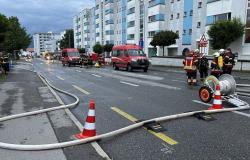The bad weather in Switzerland and its consequences, but also the natural risks linked to global warming, are making headlines in the Sunday press. There is also talk of the reform of the second pillar, which will be put to the vote in September.
Majority opposed to the LPP reform
Sunday View: The reform of occupational pension provision (LPP), put to a vote on September 22, does not convince the Swiss, reveals a survey taken by SonntagsBlick. Only 30% of those questioned said they were in favor of the project. On the other hand, 45% are opposed to it. The survey, commissioned by the Swiss Trade Union Union (USS), was carried out among a representative sample of 1,045 people by Feldlabor GmbH run by Oliver Strijbis, professor of political science at Franklin University in Zurich. The result is, however, questioned by the Swiss Employers’ Union. “The question asked does not provide a representative result,” says a UPS spokesperson.
Divorce to receive a higher pension
Sunday Newspaper: More and more married couples are divorcing once they retire in order to receive higher AVS pensions, reports SonntagsZeitung. Thanks to this practice, which is legal, the couple can increase their pensions up to 1,225 francs. A Zurich lawyer, specializing in divorces, explains in the newspaper that several hundred couples end their union each year to get better pensions. After the divorce, they continue to live together as before, he adds. The operation is even cheaper without going through a lawyer, specifies the specialist. Divorce then only costs 1500 francs. This divorce trend is on the rise, continues the lawyer.
Increase in counterfeit banknotes
Sunday View: The number of counterfeit banknotes withdrawn from circulation in Switzerland has never been as high as in 2023, notes SonntagsBlick, citing data from the Federal Office of Police (fedpol). It is mainly fraudulent euro notes that have exploded, with the value of the confiscated banknotes reaching more than 13 million euros in 2023. In previous years, this value was below two million euros. The value of counterfeit Swiss banknotes last year amounted to 2.5 million francs. A fedpol spokesperson explains that the increase in counterfeit euros is mainly due to larger seizures in new fraudulent techniques, “rip deals”. One of the most popular involves showing luxury goods sellers bags full of banknotes and then surreptitiously exchanging them for bags containing counterfeit money.
Cargo Underground in need of support
NZZ on Sunday: The private Cargo Sous Terrain (CST) project, which aims to transport goods underground across Switzerland, has lost one of its main supporters, Migros, writes the NZZ am Sonntag. The Swiss retail giant will not provide “additional money” for the further planning of the project, its spokesman tells the newspaper. The same applies to future investments in the construction of the tunnel, he adds. “Migros will not participate in it.” CST interim CEO Stefan Schraner is not surprised. Migros’ position has been known for years, he adds. According to him, Migros and Coop are not seen as investors for the construction, but as future customers. Institutional investors are interested in entering the project, Schraner says.
Risk of damage
Le Matin Dimanche/Sunday Newspaper: Urbanization, which is progressing very quickly throughout the world, increases the risk of damage during bad weather, explains in Le Matin Dimanche and the SonntagsZeitung Balz Grollimund, responsible for the development of catastrophe risk models at the insurer of insurers Swiss Re. Cities, which “are often located by the sea, rivers or lakes, where flooding is potentially more frequent”, concentrate the majority of demographic growth and the increase in wealth, notes he. Disasters therefore cause more damage there, he adds. “And the more surface area there is built, the more risk there is of damage.”
Displacement of inhabitants
NZZ on Sunday: The increase in natural hazards in the mountains due to climate change will cause a displacement of residents from the affected regions, warns an expert in the NZZ am Sonntag. “We will lose living space in the Alps,” adds Reinhard Steurer, professor of climate policy at BOKU University in Vienna, Austria. Some valleys will empty, he notes. For now, we can still repair the damage caused by the floods and mudslides and rebuild the destroyed houses, “but if this happens two or three times and in an already sparsely populated region, we can no longer justify reconstruction from a socio-economic point of view,” explains the expert.
Real estate and risk areas
Sunday Newspaper: Houses and apartments located in risk areas show relatively small drops in value in Switzerland, notes the SonntagsZeitung. The properties most affected by the loss of value are those located in areas where there is a significant risk of flooding (-3.3%), radon (-3.6%) or landslide (-5 .8%). When asked, the real estate consultancy Wüest Partner does not expect further significant declines in risk areas in the near future, as demand for real estate continues to exceed supply. In certain risky areas, particularly where there is sloping land, no drop in value is detectable, because the buyer is prepared to pay more for a beautiful view.
Valais deprived of payments
NZZ on Sunday: The Swiss Confederation has suspended initial payments to the canton of Valais after it decided to revise downwards the project for the third Rhône correction. “In December 2022, the FOEN informed the canton of Valais that subsidy payments for certain services […] would be suspended,” indicates the Federal Office for the Environment (FOEN). The salaries of Valais civil servants working for the project are particularly affected. Seven full-time positions that have been funded so far by the Confederation will no longer be. According to Valais State Councilor Franz Ruppen, Berne has suspended the payment of 1.8 million francs at the end of 2023 and is no longer paying it to Valais. (ATS)






